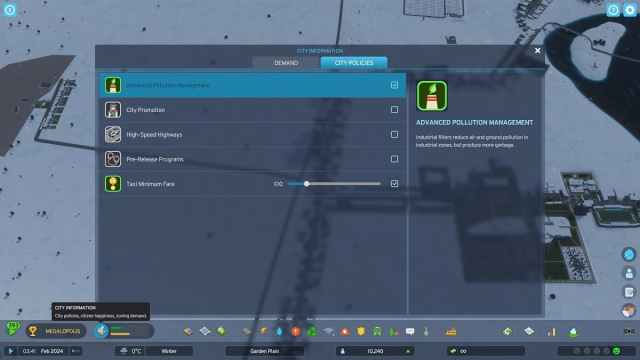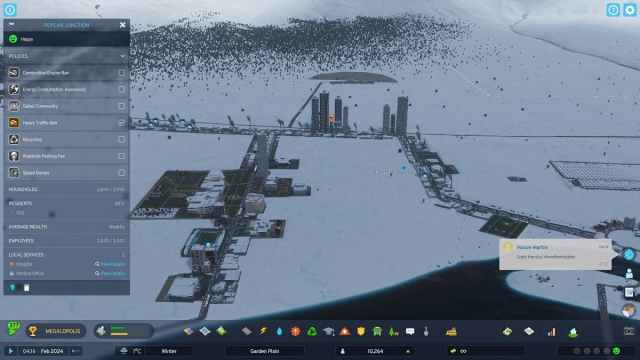Nothing’s stopping you from implementing every available policy in your city, but that doesn’t mean you should. Some have obviously positive effects, but others can totally derail your metropolis and the districts within them. Here are the best policies to pick in Cities Skylines 2 for both cities and districts.
The Best City and District Policies to Use in Cities Skylines 2
City Policies to Get First
The policy options are different for cities and districts. So, I’ll cover the best of each here, as well as some situational policies that you may want to implement. The best City Policies to start with are Taxi Minimum Fare and Advanced Pollution Management.

- Taxi Minimum Fare: This policy lets you set an additional cost for taxi rides, increasing your city’s revenue. It’s a flat rate added to the price of the fare, and it pairs well with the Dispatch Center upgrade.
- Advanced Pollution Management: This policy reduces air and ground pollution in Industrial areas, but it increases the amount of garbage produced. However, landfills can handle a large amount of garbage; even when my city had 20,000 citizens, my landfill was well under halfway full. The effect varies based on the number of Industrial areas you have and the size of your landfill, but the overall pollution reduction is a huge benefit.
Testing with a population of just 17 Cims, I confirmed that you can choose these from the beginning of the game in the City Policies menu, brought up by pressing “C”.
District Policies to Choose First

Then, we have District Policies. Like City Policies, choose these based on the needs of your district at the time. Though some like to turn them off, I keep an eye on Chirper to know what my city and its districts need. Since policies can be changed at any time, I adjust them as needed to fix issues like happiness, lack of free time, or high crime rates.
The three District Policies I always choose are Speed Bumps, Heavy Traffic Ban, and Energy Consumption Awareness.
- Speed Bumps: This policy lowers the driving speed in the district, reducing noise pollution and traffic accidents. In a district with residential zones, this policy makes your Cims happy.
- Heavy Traffic Ban: This policy has a similar effect here as it does in Cities: Skylines. It reduces noise and air pollution, plus it can improve traffic flow. Like with Speed Bumps, districts with residential zones love this policy. Cims hate living in places that are polluted. And they complain about traffic jams and congestion. There’s really no downside to implementing this one.
- Energy Consumption Awareness: This policy does exactly what it says: reduces energy. There are negative effects, and you’ll see a drop in consumption by 5%.
The Best Situational Policies
While those are the best CS2 policies, there are plenty of policies that I use to address specific situations. I don’t keep them active constantly like I do with the ones mentioned above.
- Pre-Release Programs: This is a city policy that educates prisoners with the goal of reducing crime reoccurrence. However, my city hasn’t gotten big enough to have crime issues, so I haven’t implemented it.
- City Promotion: Another city policy, this one increases tourism. But you won’t want to leave it implemented permanently because tourism also increases crime rates. Unless you combine it with Pre-Release Programs and have a good police presence in your city.
- Recycling: This is a district policy. Recycling reduces garbage, but your Cims will have less free time, which leads to more unhappiness. So, this is another one that I’ll use if my landfills are getting too full. But I won’t leave it active permanently so that my Cims can have their free time back.
- Roadside Parking Fee: Another district policy, this one adds a fee for parking on the road in the district. The result is that you increase city revenue. However, I’m wary about using it in districts with lower income or households complaining of high rent to avoid burdening their finances even more. And in my testing, no: it doesn’t force Cims to use parking lots.
And those are the best policies to choose in Cities Skylines 2. With all the DLC content coming in future months, I’d love to see more policies to choose from to help with other factors like water consumption. But for now, check out our CS2 guide hub for topics like how to fix the broken Post Sorting Facility or these 10 beginner tips.







Published: Nov 15, 2023 03:58 pm